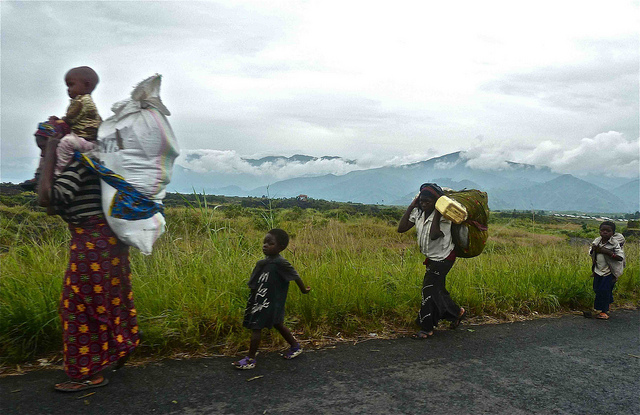
Yesterday marked the 11th official commemoration of World Refugee Day.
World Refugee Day was established in 2001 by the U.N. General Assembly in recognition of the 50th anniversary of the 1951 Convention relating to the Status of Refugees. Since then, June 20 has been commemorated around the world as a day to recognize the strength and courage of the men, women, and children who have been forced to flee their homes as a result of violence and conflict. The U.N. High Commissioner for Refugees, or UNHCR, estimates that there are currently over 42.5 million refugees and internally displaced persons worldwide, a majority of whom are women and children. A record 800,000 people were forced to flee across borders in 2011 alone.
Today, one of the most dire refugee situations underway is in the Democratic Republic of the Congo. U.N. reports have cited that the recent outbursts of violence between the Congolese military and defector army militants loyal to General Bosco Ntaganda, who is wanted by the International Criminal Court, have sparked a mass influx in refugees fleeing the region. The Congolese civilian population has found themselves caught in the middle of the fighting and, in some cases, systematically targeted. Threats of abduction, rape, and involuntary militia recruitment have forced civilians to flee into neighboring countries.
For some Congolese families, Uganda has been the chosen place of refuge due to its close proximity to the conflict in Congo’s North Kivu province. As a result, Uganda is challenged by the constant back and forth movement of Congolese refugees. Many of the refugees who come into Uganda do not want to claim permanent refugee status. Dubbed “seasonal border crossers,” many Congolese flee into Uganda during outbreaks of violence and then return to Congo once fighting subsides. Like many other refugees, they are not ready to leave their homes and villages but at the same time understand the severity of the violence. In extreme cases, some Congolese refugees choose to live in Uganda only at night and commute back to their homes during the day so they can tend to their fields and farm animals.
While no longer in immediate harm, many of the refugees experience incredible hardship while living in the camps. Lack of food, poor sanitation, and inadequate shelter are common concerns and often threaten the livelihoods of the camp inhabitants. For some Congolese, these conditions act as reasons not to flee, leaving them vulnerable to further attacks as they attempt to survive on their own within their abandoned communities.
In recognition of World Refugee Day, we must reflect on the difficult challenges faced by the civilian populations of these devastating conflicts. "We must work together to mobilize the political will and leadership to prevent and end the conflicts that trigger refugee flows,” said U.N. Secretary-General Ban Ki-moon. “Despite budget constraints everywhere, we must not turn away from those in need. Refugees leave because they have no choice. We must choose to help."
It is important to not only support the Congolese refugees with sentiments and good will but also with pro-active policy solutions that will allow the civilian population to return to their homes and find peace. On the occasion of World Refugee Day, the Enough Project urges the international community and the U.N. peacekeeping mission in Congo, MONUSCO, to uphold the mandate of civilian protection and partner with the Congolese government to work towards peace as well as social and economic development for these communities affected by ongoing conflict.
Photo: Women and children flee with some belongings to avoid fighting in eastern Congo (Enough / Sarah Zingg Wimmer)

